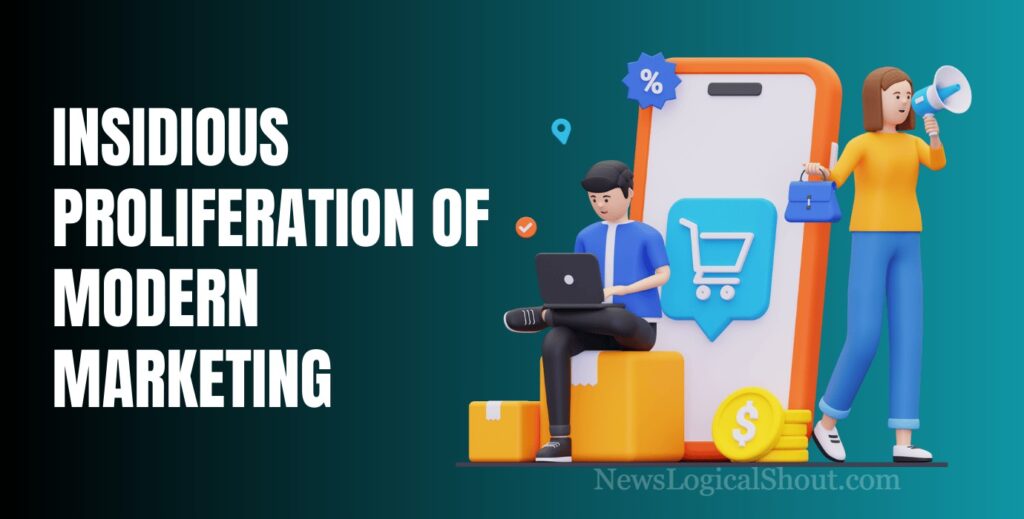Introduction
The insidious proliferation of marketing is an alarming trend that affects every aspect of our daily lives. From social media ads to pop-ups and personalized messages, marketing tactics have become increasingly pervasive and often manipulative. In this article, we will explore the risks and consequences of this growing issue and examine how it affects consumers, businesses, and society at large.
What is the Insidious Proliferation of Marketing?
The term “insidious proliferation of marketing” refers to the rapid and subtle increase in marketing efforts across all platforms and spaces, often in ways that go unnoticed. It involves the use of psychological techniques to influence consumer behavior, creating a more aggressive and invasive marketing environment.
This form of marketing is not always overt. It has evolved into sophisticated methods that infiltrate various aspects of life, from the ads we see online to the recommendations we receive in our inboxes or social media feeds.
The Role of Technology in Marketing Proliferation
Technology plays a critical role in the proliferation of marketing. With the rise of digital platforms, companies now have access to vast amounts of personal data, allowing them to create highly targeted marketing campaigns.
Through algorithms and artificial intelligence, brands can predict consumer behavior and deliver messages tailored specifically to an individual’s preferences.
While these advancements in technology have made marketing more efficient, they have also led to an increase in how intrusive and manipulative it can be. With technology, marketers can track user activity across websites, apps, and even social media platforms to craft their strategies.
The Hidden Dangers of Targeted Advertising

Targeted advertising is one of the most insidious aspects of modern marketing. It uses consumer data to personalize ads, making them more effective but also more invasive. While targeted ads can be seen as an effective tool for businesses, they also present significant privacy risks.
For consumers, this practice can feel unsettling as it allows companies to collect detailed personal information without their full knowledge or consent. The more information that is gathered, the more companies can predict and manipulate individual behavior, resulting in a loss of personal autonomy.
The Emotional Manipulation Behind Marketing Tactics
One of the key risks of the insidious proliferation of marketing is the emotional manipulation used by many advertisers. Modern marketing strategies rely heavily on psychological tactics that appeal to emotions, desires, and fears. Ads often use persuasive imagery, language, and themes that can make people feel inadequate, anxious, or fearful, prompting them to make purchases they wouldn’t otherwise consider.
For example, beauty and fitness brands often create a sense of urgency, making consumers feel they must look a certain way to be accepted or successful. Similarly, tech companies often use fear-of-missing-out (FOMO) tactics to encourage immediate purchases of new gadgets or services.
The Impact on Mental Health and Well-being
The continuous bombardment of marketing messages can have detrimental effects on mental health. Constant exposure to advertisements promoting unrealistic beauty standards, lifestyle goals, and material wealth can lead to feelings of inadequacy, low self-esteem, and anxiety.
Moreover, the pressure to constantly keep up with the latest trends or buy the newest products can contribute to consumerism and the stress of financial instability. As marketing becomes more personalized and aggressive, these issues are only likely to increase.
Marketing to Children: The Growing Concern
One of the most concerning aspects of the insidious proliferation of marketing is the targeting of children. Companies use colorful, appealing ads to capture the attention of younger audiences, often encouraging them to buy toys, games, and unhealthy foods.
Studies have shown that children are particularly vulnerable to advertising, as they may not yet have developed the ability to critically evaluate marketing messages. This has led to a growing concern about the ethical implications of marketing targeted at children and the long-term impact on their consumer habits.
How the Insidious Proliferation of Marketing Affects Society
The insidious proliferation of marketing doesn’t just affect individuals; it has a broader impact on society as a whole. The over-saturation of advertising has contributed to a culture of consumerism, where people are constantly seeking the next product or service to fulfill their desires.
This constant push to buy can lead to environmental degradation, as more products are created, consumed, and discarded. Additionally, the focus on material wealth and status can contribute to social inequality, as people strive to maintain a certain image or lifestyle that may be financially unsustainable.
The Risk of Consumer Manipulation and Exploitation
With the growing power of marketing, consumers are increasingly at risk of manipulation and exploitation. The insidious nature of modern marketing tactics often blurs the line between information and persuasion, making it difficult for consumers to distinguish between genuine product reviews and paid promotions.
Consumers may feel compelled to buy products not because they need them, but because they have been manipulated into believing they must have them to fit in or be successful. This exploitation can lead to poor purchasing decisions, financial strain, and dissatisfaction with products that do not live up to expectations.
The Role of Influencers in the Marketing Landscape
Influencers have become a key component of the modern marketing landscape. With their massive social media followings, influencers promote products to millions of consumers, often blurring the lines between personal recommendations and advertising.
While influencers can provide valuable information and insight, they can also perpetuate the insidious proliferation of marketing by encouraging their followers to buy products without fully understanding the commercial nature of the content.
This form of marketing, known as “native advertising,” can be particularly dangerous because it feels more like a personal endorsement than a paid promotion.
Ethical Implications of the Insidious Proliferation of Marketing

The insidious proliferation of marketing raises important ethical questions. As advertising becomes more invasive and manipulative, there are concerns about consumer rights, privacy, and autonomy.
Should businesses be allowed to collect and use personal data for marketing purposes without full consent? Should companies be held accountable for the mental and emotional toll their marketing tactics take on consumers?
These questions highlight the need for stronger regulation in the marketing industry to ensure that companies are held accountable for their actions and that consumers are protected from unethical practices.
How to Protect Yourself from the Insidious Proliferation of Marketing
As consumers, there are steps we can take to protect ourselves from the insidious proliferation of marketing. One of the most effective ways to reduce exposure to targeted ads is by adjusting privacy settings on social media platforms and using ad-blocking software to limit intrusive advertisements.
It’s also important to be aware of the tactics used in marketing campaigns and develop critical thinking skills to evaluate the messages we encounter. By being more mindful of the advertisements we engage with, we can make more informed decisions and avoid falling prey to manipulative marketing tactics.
Conclusion
The insidious proliferation of marketing is a trend that shows no signs of slowing down. As technology continues to advance and marketing strategies become more sophisticated, consumers will face even greater challenges in protecting their privacy and well-being.
To combat the negative effects of aggressive marketing, it’s crucial for both consumers and businesses to work together to promote ethical practices. Consumers must stay informed and critical of the messages they encounter, while businesses must prioritize transparency, honesty, and respect for consumer privacy.
Ultimately, a balance must be struck between the benefits of marketing for businesses and the need for consumer protection. By raising awareness of the risks and consequences of the insidious proliferation of marketing, we can foster a more responsible and ethical marketing environment.


